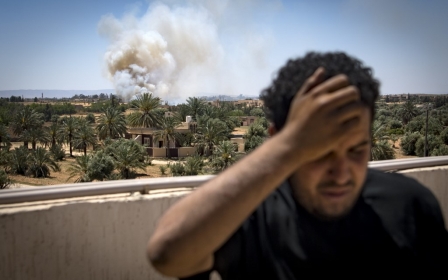Berlin summit backs Libya ceasefire as Haftar's forces choke oil flows

World powers agreed at a summit in Berlin on Sunday to shore up a shaky ceasefire in Libya, though serious progress towards ending fighting and the influx of foreign arms and fighters was not forthcoming.
Meanwhile, forces loyal to eastern commander Khalifa Haftar are blockading Libya's precious oil fields, potentially crippling the country's production of crude.
Haftar, whose self-styled Libyan National Army (LNA) is bearing down on the capital Tripoli with the backing of Egypt, the United Arab Emirates, Russian mercenaries and African troops, attended the one-day summit in the German capital despite having abandoned talks over a truce last week.
Turkey has rushed troops to Tripoli, as well as Turkish-backed fighters from Syria, to help Libya's internationally recognised Government of National Accord (GNA), led by Prime Minister Fayez al-Sarraj, resist Haftar's assault.
Libya has had no stable central authority since Muammar Gaddafi was overthrown by NATO-backed rebels in 2011. For more than five years it has had two rival governments, in the east and the west.
Stay informed with MEE's newsletters
Sign up to get the latest alerts, insights and analysis, starting with Turkey Unpacked
German Chancellor Angela Merkel told reporters that the Berlin summit, attended by the main backers of the rival Libyan factions, had agreed that a truce in Tripoli over the past week should be turned into a permanent ceasefire to allow a political process to take place.
A special committee made up of five military men from each side will monitor the truce, Merkel said. Foreign powers active in Libya have committed themselves to uphold an existing UN arms embargo and to stop shipping weapons there, she added.
The presidents of Russia, Turkey and France were among global chiefs signing up to the plan to stop interfering in the war - be it through weapons, troops or financing.
"We commit to refraining from interference in the armed conflict or in the internal affairs of Libya and urge all international actors to do the same," a draft of the conference conclusions seen by MEE read.
"We reaffirm our strong commitment to the sovereignty, independence, territorial integrity and national unity of Libya. Only a Libyan-led and Libyan-owned political process can end the conflict and bring lasting peace."
Still, the talks failed to deliver "serious dialogue" between the warring parties or to persuade both sides to agree to a permanent truce.
"It is clear that we have not yet succeeded in launching a serious and stable dialogue between them," Russian Foreign Minister Sergei Lavrov told reporters after the Berlin conference, where Haftar and Sarraj did not meet face to face.
"We know that we have not solved all of Libya's problems today but we were aiming for fresh momentum," Merkel said.
Haftar quit a Turkish-Russian summit a week ago and escalated the conflict on Friday when eastern oil ports were shut down. Libya's National Oil Corporation (NOC) said the shutdown was directly ordered by Haftar's forces.
On Sunday, as international leaders were gathering in the German capital, state oil firm NOC said the major southwestern fields of El Sharara and El Feel were closed after forces loyal to Haftar shut a pipeline.
The closures will cut Libya's oil output to 72,000 barrels a day from 1.2 million bpd in just a few days' time unless the blockages are lifted, the NOC said.
Any lasting closure could hit Tripoli hard since the government relies on oil revenues to fund its budget.
UN Secretary General Antonio Guterres said he was very worried about the closure. German foreign minister Heiko Maas said Sarraj and Haftar had "in general" agreed to solve the output blockage, without giving a timeframe.
A call for a ceasefire from Russia and Turkey helped reduce fighting a week ago, Russian President Vladimir Putin said ahead of a meeting with Turkish counterpart Recep Tayyip Erdogan on the sidelines of the conference.
"We don't lose hope that dialogue will continue and the conflict will be solved," Putin said.
For Turkey, the fall of Sarraj's GNA could jeopardise a maritime boundary agreement the parties signed. It gives Ankara extensive rights over the eastern Mediterranean where the recent discovery of undersea gas reserves has triggered a scramble by littoral states.
Erdogan has repeatedly urged Europe to stand united behind Sarraj's government, warning that Tripoli's fall could allow groups like Islamic State or al-Qaeda to regroup.
He has also cautioned that further unrest could prompt a new wave of migrants to head for Europe.
Amid the latest apparent ceasefire violation in which GNA forces on Sunday accused Haftar's militia of opening fire on them in southern Tripoli, Sarraj issued a plea for international "protection troops" if Haftar keeps up his offensive.
The call echoed a similar suggestion by the EU's chief diplomat Josep Borrell, who stressed that monitors must be present to check that any ceasefire and weapons embargo are respected.
With the idea gathering pace, Britain and Italy have voiced readiness to help.
Still, as Guterres noted, that discussion remains premature.
"First, we need to have a ceasefire - we cannot monitor something that doesn't exist."
Middle East Eye delivers independent and unrivalled coverage and analysis of the Middle East, North Africa and beyond. To learn more about republishing this content and the associated fees, please fill out this form. More about MEE can be found here.






